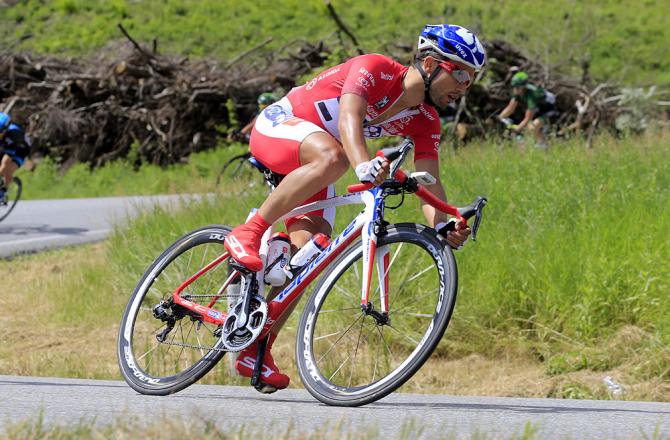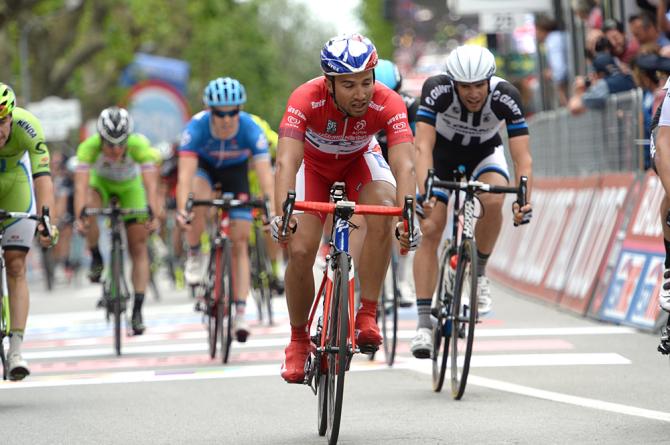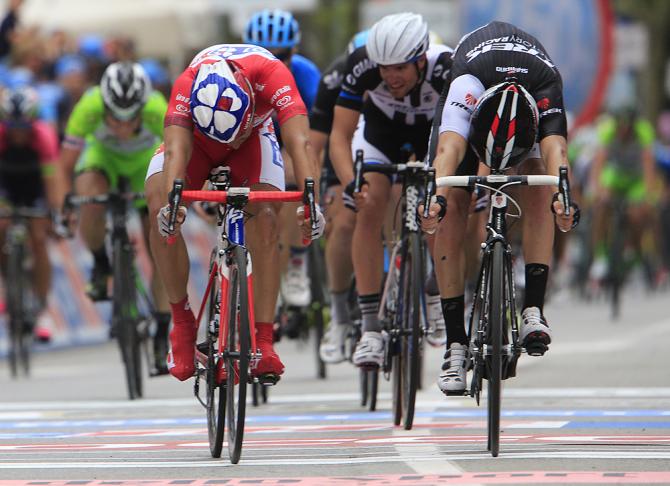Bouhanni frustrated after breakaway sticks on stage 13 of Giro d'Italia
Points leader disappointed other teams did not cooperate



This Giro d’Italia has been an unpredictable race in every which way but one. Through the first twelve stages of the race, there had been only one breakaway victory – Michael Rogers in Savona – while the other road stages had ended either in bunch finishes or sizable group sprints.
On the short, flat run from Fossano to Rivarolo Canavese on stage 13, the script seemed an eminently familiar one. An early break would form, establish a lead and then get pegged back, before Nacer Bouhanni (FDJ.fr) won the inevitable bunch sprint.
Bouhanni duly held up his end of the bargain by leading the peloton home, but unfortunately for the Frenchman, the sprint he won was for fourth place, 11 seconds down on winner Marco Canola (Bardiani-CSF) and his breakaway companions.
Yet when Canola, Jackson Rodriguez (Androni-Venezuela) and Angelo Tulik (Europcar) had swept onto the finishing circuit with 24 kilometres to race, their lead was just 1:24 and the stage seemed to be dutifully following the preordained running order. After spending much of the second half of the stage keeping tabs on the break’s lead, however, FDJ.fr simply did not have the manpower to keep up the chase into the finale, but there was a costly delay before the other sprinters’ teams – Cannondale, Trek and Garmin-Sharp – sent delegations to the front of the bunch.
"After the line, I was disappointed because my team worked a lot today and we weren’t rewarded for it," Bouhanni said afterwards. "We did everything possible to bring the break back and maybe if we’d had some more help from the other teams, we’d have caught them. But the others didn’t ride…"
The Cannondale team of Elia Viviani had been prominent allies of circumstance for FDJ through the opening two weeks of the Giro, but after the Italian’s repeated failure to better Bouhanni, not to mention his crash two days ago and ongoing struggle with a fever, they opted to maintain a watching brief on Friday.
"Between my fall and my fever, we were happy to let the other teams work to bring it back together for a sprint," Viviani told RAI television, while his manager Roberto Amadio admitted, "We didn’t have 100 percent certainty of winning."
Get The Leadout Newsletter
The latest race content, interviews, features, reviews and expert buying guides, direct to your inbox!
Viviani duly took third in the bunch sprint and sixth on the stage, and it was his fellow countryman Giacomo Nizzolo who again pushed Bouhanni the closest in the dash to the line. Nizzolo’s Trek Factory Racing team had been prominent in trying to set up the sprint at Salsomaggiore two days ago, but on Friday, they deliberately withheld their services in a bid to wear down FDJ and isolate Bouhanni.
"It was a missed opportunity," Nizzolo admitted afterwards. "We miscalculated the gaps and started to pull too late. It’s true we could have worked sooner, but we also have to try to weaken Bouhanni for the sprint. We tried to make his team work and leave him a man down in the finale, but we clearly didn't do the right thing."
Bouhanni at least had the consolation of increasing his lead in the points classification and as he reflected on the afternoon’s events in the mixed zone afterwards, one was reminded of the young Cristiano Ronaldo’s famous response of "Maybe it’s because I’m too good" when asked why he attracted so many polemics.
"Maybe it’s because I’ve already taken three wins," Bohanni said of the other teams’ reluctance to collaborate with FDJ. "They wanted us to control the race and then break us up. But that’s part of the game, it’s like that."
On the evidence of his Giro to date, he might have to start getting used to it.

Barry Ryan was Head of Features at Cyclingnews. He has covered professional cycling since 2010, reporting from the Tour de France, Giro d’Italia and events from Argentina to Japan. His writing has appeared in The Independent, Procycling and Cycling Plus. He is the author of The Ascent: Sean Kelly, Stephen Roche and the Rise of Irish Cycling’s Golden Generation, published by Gill Books.